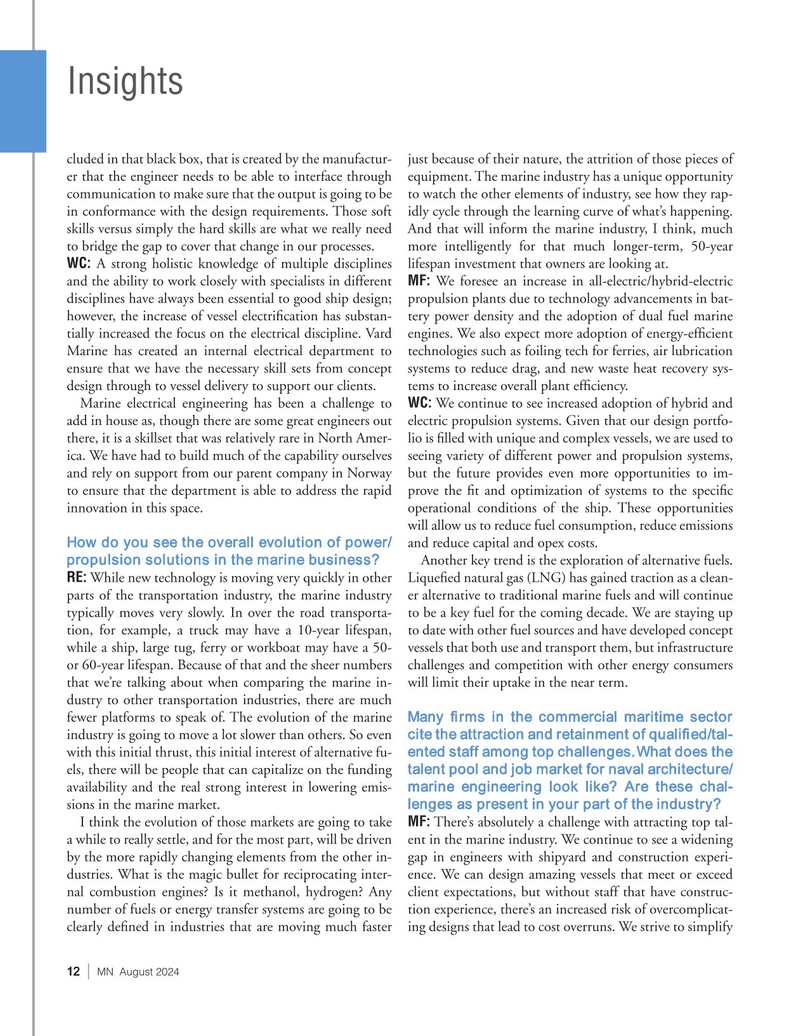
Page 12: of Marine News Magazine (August 2024)
Read this page in Pdf, Flash or Html5 edition of August 2024 Marine News Magazine
Insights cluded in that black box, that is created by the manufactur- just because of their nature, the attrition of those pieces of er that the engineer needs to be able to interface through equipment. The marine industry has a unique opportunity communication to make sure that the output is going to be to watch the other elements of industry, see how they rap- in conformance with the design requirements. Those soft idly cycle through the learning curve of what’s happening. skills versus simply the hard skills are what we really need And that will inform the marine industry, I think, much to bridge the gap to cover that change in our processes. more intelligently for that much longer-term, 50-year
WC: A strong holistic knowledge of multiple disciplines lifespan investment that owners are looking at.
and the ability to work closely with specialists in different MF: We foresee an increase in all-electric/hybrid-electric disciplines have always been essential to good ship design; propulsion plants due to technology advancements in bat- however, the increase of vessel electri? cation has substan- tery power density and the adoption of dual fuel marine tially increased the focus on the electrical discipline. Vard engines. We also expect more adoption of energy-ef? cient
Marine has created an internal electrical department to technologies such as foiling tech for ferries, air lubrication ensure that we have the necessary skill sets from concept systems to reduce drag, and new waste heat recovery sys- design through to vessel delivery to support our clients. tems to increase overall plant ef? ciency.
Marine electrical engineering has been a challenge to WC: We continue to see increased adoption of hybrid and add in house as, though there are some great engineers out electric propulsion systems. Given that our design portfo- there, it is a skillset that was relatively rare in North Amer- lio is ? lled with unique and complex vessels, we are used to ica. We have had to build much of the capability ourselves seeing variety of different power and propulsion systems, and rely on support from our parent company in Norway but the future provides even more opportunities to im- to ensure that the department is able to address the rapid prove the ? t and optimization of systems to the speci? c innovation in this space. operational conditions of the ship. These opportunities will allow us to reduce fuel consumption, reduce emissions
How do you see the overall evolution of power/ and reduce capital and opex costs. propulsion solutions in the marine business? Another key trend is the exploration of alternative fuels.
RE: While new technology is moving very quickly in other Lique? ed natural gas (LNG) has gained traction as a clean- parts of the transportation industry, the marine industry er alternative to traditional marine fuels and will continue typically moves very slowly. In over the road transporta- to be a key fuel for the coming decade. We are staying up tion, for example, a truck may have a 10-year lifespan, to date with other fuel sources and have developed concept while a ship, large tug, ferry or workboat may have a 50- vessels that both use and transport them, but infrastructure or 60-year lifespan. Because of that and the sheer numbers challenges and competition with other energy consumers that we’re talking about when comparing the marine in- will limit their uptake in the near term. dustry to other transportation industries, there are much fewer platforms to speak of. The evolution of the marine Many ? rms in the commercial maritime sector industry is going to move a lot slower than others. So even cite the attraction and retainment of quali? ed/tal- with this initial thrust, this initial interest of alternative fu- ented staff among top challenges. What does the els, there will be people that can capitalize on the funding talent pool and job market for naval architecture/ availability and the real strong interest in lowering emis- marine engineering look like? Are these chal- sions in the marine market. lenges as present in your part of the industry?
I think the evolution of those markets are going to take MF: There’s absolutely a challenge with attracting top tal- a while to really settle, and for the most part, will be driven ent in the marine industry. We continue to see a widening by the more rapidly changing elements from the other in- gap in engineers with shipyard and construction experi- dustries. What is the magic bullet for reciprocating inter- ence. We can design amazing vessels that meet or exceed nal combustion engines? Is it methanol, hydrogen? Any client expectations, but without staff that have construc- number of fuels or energy transfer systems are going to be tion experience, there’s an increased risk of overcomplicat- clearly de? ned in industries that are moving much faster ing designs that lead to cost overruns. We strive to simplify 12 | MN August 2024

 11
11

 13
13
